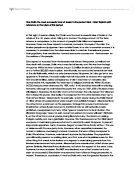How successful were the finance ministers of the period of transforming Russia economically? (1855-1904)
How successful were the finance ministers of the period of transforming Russia economically? (1855-1904)
The transformation of the Russian economy had begun in the reign of Alexander II in response to the humiliation in the defeat in the Crimean war of 1854-56. This led to a development of a railway-building programme and a limited spread of factories. However, still, by 1881, Russia’s economic development still lacked far behind that of Western Europe and there was a huge gulf between Russia’s potential, given its vast supply of natural resource’s and manpower. . I am going to be looking at the works of Ivan Vyshnegradsky 1887 - 1892 and Sergei Witte 1892 - 1904 and focus on how successful these men were in transforming Russia’s economy. It wasn’t until the reign of Alexander III a real ‘industrial revolution’ took off, and its developments owned much to Vyshnegradsky and Witte.
Ivan Vyshnegradsky was born on the 1st January 1832 in St. Petersburg. In 1886 he was appointed a member of the State Council and in 1887 became the head of the Ministry of Finance. Vyshnegradsky improved the finance of the country and built up its gold reserves by indirect tax increases and by grain imports, trading with foreign country’s needed to boost in order to transform the economy. He also reduced imports by increasing tariffs – The Tariff Act of 1891 increased duties to protect iron, industrial machinery and raw cotton from outside competition. By 1891, import duties had reached 33%. He also negotiated some valuable loans to kickstart growth, e.g. from the French in 1888. On the surface, the policy looked very successful. Between 1881 and 1891, grain exports increased by 18%, as a percentage of total Russian exports, and by 1892, the Russian budget was in surplus.
However, this export drive was achieved at the expense of the peasants. They really suffered the burden of indirect taxes, which seriously reduced their limited purchasing power. Whilst this was going on, the price of goods rose because of the import taxes and their grain was being requisitioned by the government to sell abroad. Many peasants’ were left with no reserve stores and often went hungry. A drastic consequence of this policy was the famine of 1891/2 when a bad harvest brought widespread famine, it affected 17 of Russia’s 39 provinces and around 350,000 suffered the consequences and lost their lives. Weakened by hunger, outbreaks of cholera and typhoid followed – and most families were left without their main breadwinner.
The government failed to organize adequate relief and it was left to volunteer groups to help the destitute peasant’s, this led to Vyshnegradsky’s dismissal in 1892.
So even though, the economy at first was on the up, it was to the expense of the peasants’ and this policy caused many unease and deaths within the period that could have possibly been avoided.








